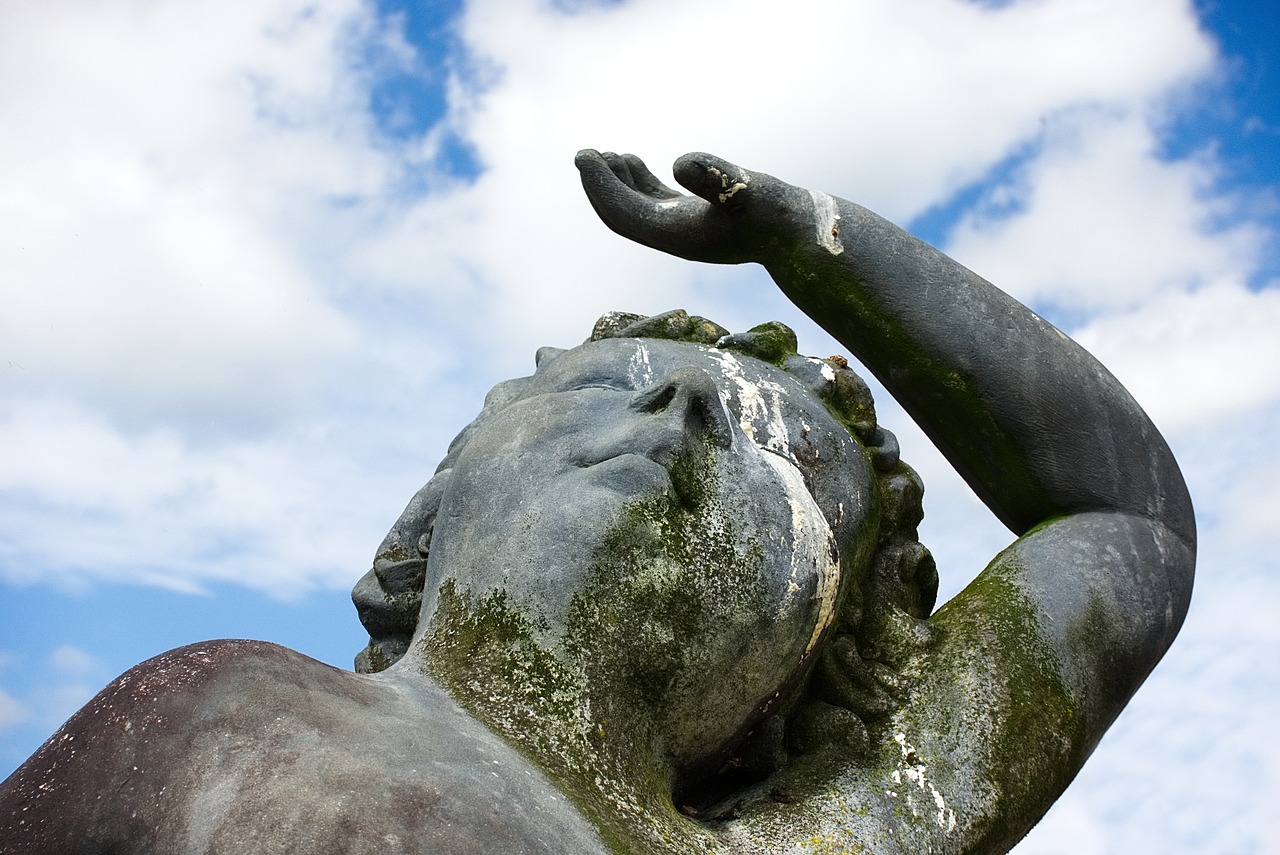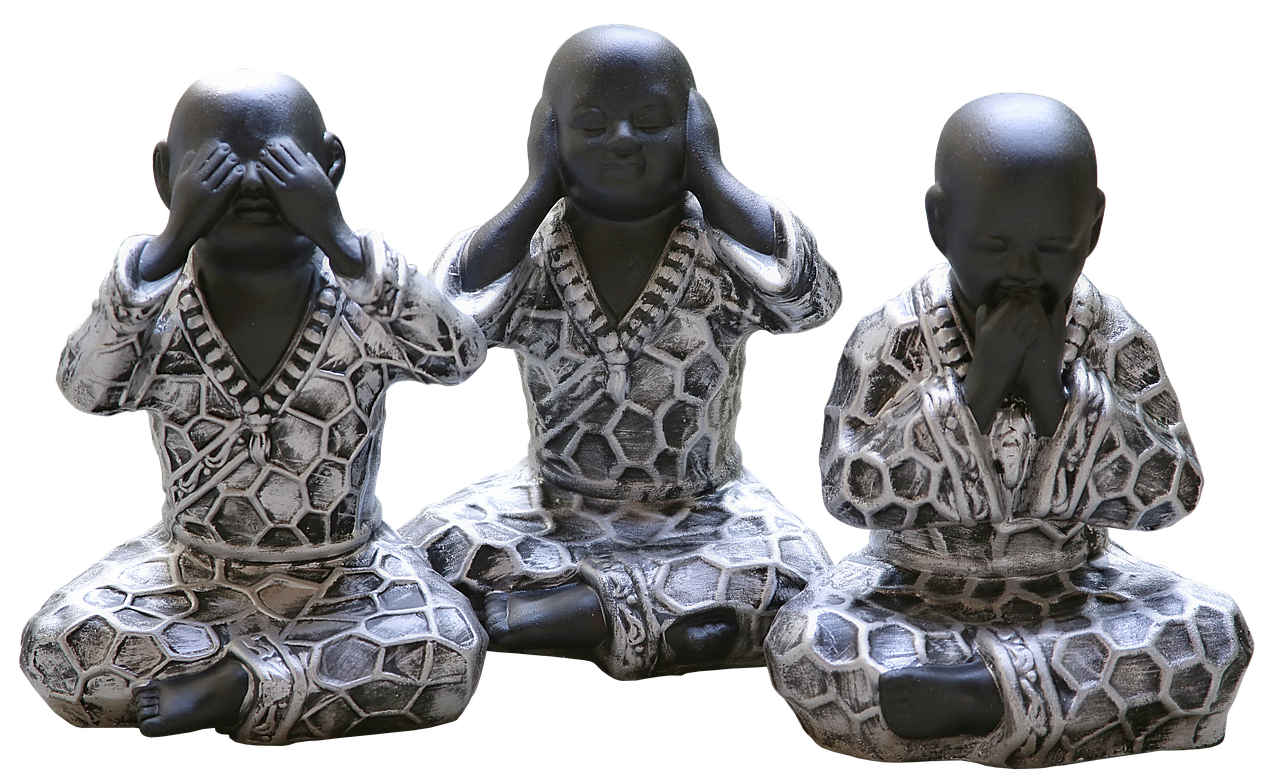The Concept of Karma in Philosophy
Karma is a term that often brings to mind images of Eastern spirituality, but its reach extends far beyond that. It encapsulates a profound understanding of the universe, where every action is like a pebble thrown into a lake, creating ripples that can travel far and wide. In essence, karma is the law of cause and effect, a principle that suggests that our actions—whether good or bad—have consequences that shape our future experiences. This intricate dance of actions and reactions is not just a philosophical idea; it is a lens through which we can view our moral choices and the impact they have on ourselves and others.
At its core, karma challenges us to think deeply about our behavior and the ethical implications of our decisions. Can you imagine living in a world where every choice you made was tied to a larger cosmic tapestry? This is the essence of karma: a reminder that we are not isolated beings, but rather part of a vast interconnected web of existence. The concept encourages us to reflect on our actions, urging us to consider how they will affect not only our lives but also the lives of those around us.
Throughout various cultures and belief systems, karma has manifested in different forms, each adding layers of meaning to this already rich concept. For instance, in Eastern philosophies such as Hinduism and Buddhism, karma is often associated with the cycle of rebirth, where the consequences of one’s actions in this life will determine the conditions of future lives. This cyclical understanding of existence emphasizes the importance of living a life of virtue and integrity, as each action carries weight and significance.
However, karma is not limited to just Eastern thought. In Western philosophies, while the term may not be explicitly used, the underlying principles of moral responsibility and the consequences of actions are explored in various ethical frameworks. Think about it: how often do we hear phrases like "what goes around comes around"? This modern interpretation of karma resonates with the idea that our choices have a way of returning to us, shaping our reality in unexpected ways.
Ultimately, the concept of karma serves as a powerful reminder of our agency in the world. It invites us to take responsibility for our actions and encourages a deeper understanding of how our choices can ripple through time and space, affecting not only our lives but also the lives of others. As we navigate through life's complexities, embracing the principles of karma can lead us to a more mindful and ethical existence, fostering a sense of accountability and compassion in our daily interactions.
- What is the origin of the concept of karma?
Karma originates from ancient Indian philosophies, particularly within Hinduism and Buddhism, where it describes the moral law of cause and effect. - How does karma influence daily life?
Karma influences daily life by reminding individuals that their actions, whether positive or negative, have consequences that can affect their future experiences. - Can karma be changed or altered?
Yes, karma can be altered through conscious choices and actions. Practicing mindfulness and making ethical decisions can lead to positive karmic outcomes. - Is karma the same as fate?
No, karma differs from fate. While fate suggests a predetermined outcome, karma emphasizes personal responsibility and the impact of one’s actions on future events.

Understanding Karma
Karma is a fundamental concept that resonates deeply within various philosophical traditions, especially in the East. At its core, karma embodies the law of cause and effect, suggesting that every action we take has a ripple effect that can influence our future experiences. Imagine throwing a stone into a pond; the ripples that spread outwards represent the consequences of your actions. This simple yet profound idea encourages us to reflect on our choices and their potential outcomes.
In many cultures, karma is not just a moral principle but a guiding philosophy that shapes how individuals navigate their lives. It serves as a reminder that our actions, whether good or bad, will eventually come back to us. This concept is particularly important in societies that value collective well-being, as it fosters a sense of responsibility towards others. By understanding karma, we can cultivate a more compassionate and ethical approach to our interactions.
Moreover, karma is often intertwined with the idea of intention. It's not merely about the action itself but also the motivation behind it. For instance, two people may perform the same act of kindness, but if one does it for recognition while the other acts out of genuine compassion, the karmic implications can differ significantly. This highlights the importance of mindfulness in our daily lives, urging us to act with sincerity and integrity.
To further illustrate the concept, let’s consider a few key aspects of karma:
- Actions and Consequences: Every action we take generates a consequence, shaping our future experiences.
- Intent Matters: The intention behind our actions plays a crucial role in determining the karmic outcome.
- Interconnectedness: Karma emphasizes the interconnected nature of life, reminding us that our actions affect not only ourselves but also those around us.
In summary, understanding karma is about recognizing the profound impact of our actions and intentions. It encourages us to live with purpose and to consider the broader implications of our choices. By embracing this philosophy, we can lead more fulfilling lives, enriched by the knowledge that we are shaping our own destinies with each decision we make.

Karma in Eastern Philosophy
Karma is not just a buzzword; it's a profound concept that resonates deeply within Eastern philosophies, particularly in Hinduism and Buddhism. At its core, karma represents the intricate web of cause and effect, where every action, no matter how small, reverberates through time and space, shaping our future experiences. Imagine throwing a pebble into a pond—the ripples that spread outwards symbolize the far-reaching consequences of our deeds. This understanding of karma instills a sense of responsibility, urging individuals to consider the implications of their actions.
In Hinduism, karma is intricately linked to the belief in reincarnation. The actions we take in this life are not merely fleeting moments; they are seeds sown for future lives. Good deeds can lead to a favorable rebirth, while negative actions may result in a less fortunate existence. This cyclical nature of life emphasizes the importance of living according to dharma, or righteous duty. When individuals align their actions with dharma, they not only enhance their current life but also set a positive trajectory for their future incarnations.
Within the Hindu framework, karma is often categorized into three types: sanchita, prarabdha, and agami. Sanchita karma refers to the accumulated karma from all past lives, while prarabdha karma is the portion of this accumulated karma that is currently being experienced in this lifetime. Agami karma, on the other hand, pertains to the actions we take now that will affect our future. This classification highlights the continuous nature of karma, reinforcing the idea that our present choices are pivotal in shaping our destiny.
Dharma, the moral law that governs individual conduct, is crucial in understanding the connection between karma and ethical living. It serves as a guiding principle, encouraging individuals to act in ways that promote harmony and balance in society. When one adheres to dharma, they not only fulfill their responsibilities but also cultivate positive karma. This relationship is akin to a dance; when both partners move in sync, the outcome is beautiful and fulfilling. Conversely, straying from dharma can lead to chaos and negative karma, creating a ripple effect that can impact not just the individual but the community as a whole.
The consequences of karma can manifest in myriad ways, influencing one's social status, health, and overall life experience. For instance, a person who consistently engages in acts of kindness and generosity may find themselves surrounded by supportive relationships and good fortune. In contrast, someone who acts selfishly may experience isolation and hardship. This concept encourages ethical behavior and accountability, reminding us that our choices matter. The idea that "what goes around comes around" is not just a catchy phrase; it encapsulates the essence of karmic philosophy.
Buddhism offers a nuanced understanding of karma, focusing on intentional actions and their profound impact on the path to enlightenment. Unlike the deterministic view of karma, Buddhism emphasizes the power of mindfulness and conscious choices. Every action we take, whether it's a thought, word, or deed, creates an imprint on our consciousness. This perspective encourages individuals to engage in practices that cultivate awareness and compassion, ultimately leading to a more enlightened state. By understanding the consequences of our actions, we can actively shape our experiences and foster positive change.
In essence, karma in Eastern philosophy is a rich tapestry woven from the threads of moral responsibility, ethical conduct, and the cyclical nature of life. It serves as a powerful reminder that our actions have consequences, urging us to live with intention and mindfulness. As we navigate through life, let us remember that every choice we make is a stepping stone on our journey, influencing not just our own path but the paths of those around us.
- What is the difference between karma and dharma? Karma refers to the actions and their consequences, while dharma is the moral duty or law that guides those actions.
- Can karma be changed? Yes, through mindful actions and choices, individuals can create positive karma and alter their life paths.
- Is karma only about punishment and reward? No, karma encompasses a broader understanding of moral responsibility and the interconnectedness of all actions.

The Hindu Perspective
Karma, in the Hindu tradition, is not just a concept; it's a guiding principle that shapes the very fabric of existence. Imagine it as a cosmic ledger where every action, thought, and intention is recorded. This intricate system of cause and effect underscores the belief in reincarnation, where the deeds of one life echo into the next. The idea is simple yet profound: your current life circumstances are a direct result of your past actions, and your present actions will dictate your future. This cyclical nature of life emphasizes the importance of living with intention and purpose.
At the heart of this belief lies dharma, which refers to the moral laws and duties that govern individual conduct. Dharma is akin to a compass that guides individuals in making ethical choices, ensuring that their actions align with universal principles of righteousness. For Hindus, understanding the connection between karma and dharma is crucial. It’s not merely about avoiding negative outcomes; it’s about actively contributing to the well-being of oneself and others. The interplay of karma and dharma creates a framework for living a balanced life, where every action is weighed against its potential impact on the greater good.
To illustrate this relationship, consider the following table that highlights key aspects of karma and dharma:
| Karma | Dharma |
|---|---|
| Refers to actions and their consequences. | Refers to moral duties and righteousness. |
| Impacts future lives based on past actions. | Guides individuals in making ethical choices. |
| Encourages accountability for one's actions. | Promotes harmony and balance in society. |
The consequences of karma can manifest in various forms, influencing aspects of life such as social status, health, and overall experiences. For instance, someone who consistently acts with kindness and compassion may find themselves surrounded by supportive relationships and positive opportunities. Conversely, negative actions can lead to challenges and hardships, reinforcing the idea that we are the architects of our own destinies. This perspective encourages individuals to take responsibility for their actions, fostering a sense of accountability that is essential for personal growth.
Ultimately, the Hindu perspective on karma serves as a powerful reminder of the interconnectedness of all beings. It invites us to reflect on our actions and their implications, urging us to cultivate a mindset of mindfulness and intentionality. By embracing this philosophy, we can navigate life with a deeper understanding of how our choices shape not only our own lives but also the lives of those around us. In this way, karma becomes not just a concept of punishment or reward, but a profound invitation to live with purpose and integrity.
- What is the main idea behind karma in Hinduism? Karma in Hinduism is the law of cause and effect, where every action has consequences that influence future lives.
- How does dharma relate to karma? Dharma refers to the moral duties and responsibilities that guide individuals in making ethical choices, which in turn affects their karma.
- Can karma be changed? Yes, through conscious and intentional actions, individuals can change their karmic outcomes and influence their future experiences.

Karma and Dharma
Understanding the intricate relationship between karma and dharma is essential for anyone looking to navigate the complexities of life with a moral compass. At its core, dharma represents the ethical duties and responsibilities that each individual has towards themselves and society. It serves as a guiding principle that helps individuals determine what is right and just in their lives. Think of dharma as the roadmap that directs you on your journey, while karma is the fuel that propels you forward based on the choices you make along the way.
In Hindu philosophy, this connection is profound. When one acts in accordance with their dharma, they create positive karma, which can lead to favorable outcomes not just in this life, but in future reincarnations as well. Conversely, neglecting one’s dharma can result in negative karma, impacting not only the individual but also the larger community. This interconnectedness emphasizes the importance of making conscious choices that align with both personal values and societal norms.
To illustrate this relationship further, consider the following aspects:
- Dharma as Duty: Each person has unique responsibilities based on their role in life—be it as a parent, professional, or friend. Fulfilling these duties contributes positively to one’s karma.
- Karma as Consequence: Every action, whether good or bad, generates karma that influences future experiences. This reinforces the idea that our choices matter.
- Balance and Harmony: Living in accordance with dharma fosters balance and harmony in one’s life, leading to better karma and a more fulfilling existence.
This dynamic interplay between karma and dharma encourages individuals to reflect on their actions and their motivations. It prompts a deeper understanding of how personal choices ripple through the fabric of existence, affecting not only the individual but also the collective. By adhering to dharma, individuals can cultivate a life of purpose and integrity, ultimately leading to positive karmic outcomes that enrich their future experiences.
In a world that often seems chaotic and unpredictable, the principles of karma and dharma offer a beacon of hope and guidance. They remind us that we are not merely passive participants in life; rather, we are active creators of our destiny. So, the next time you find yourself at a crossroads, consider how your choices align with your dharma, and remember that every action carries weight in the grand tapestry of existence.

Karmic Consequences
Karmic consequences are often viewed as the intricate tapestry woven from the threads of our actions. Imagine life as a vast ocean where every ripple you create sends waves across the water. In this sense, karma serves as both the cause and effect of our deeds, shaping our experiences in profound ways. The idea that our choices today can echo into our future is not just philosophical; it’s a guiding principle that encourages individuals to act with intention and mindfulness.
When we speak of karmic consequences, we are referring to the various forms these outcomes can take. They might manifest in significant life events, such as changes in social status, health challenges, or even unexpected opportunities. For example, someone who consistently shows kindness and compassion may find that these traits lead to supportive relationships and a fulfilling life. Conversely, an individual who engages in harmful behavior may face obstacles and hardships that reflect their actions. This duality highlights the importance of ethical behavior and personal accountability, as every action we take can have a ripple effect on ourselves and those around us.
To illustrate this concept further, consider the following table that summarizes potential karmic consequences based on different types of actions:
| Type of Action | Potential Karmic Consequences |
|---|---|
| Acts of Kindness | Positive relationships, support from others, inner peace |
| Dishonesty | Loss of trust, isolation, guilt |
| Selfish Behavior | Loneliness, missed opportunities, regret |
| Generosity | Abundance, community support, gratitude |
This table serves as a reminder that our actions are not isolated incidents; they are part of a larger narrative that unfolds over time. The karmic cycle encourages us to reflect on our choices and their potential impacts, not only on our lives but also on the lives of others. It’s a powerful call to live with intention, emphasizing that every small act of kindness can create a wave of positivity that returns to us in unexpected ways.
Ultimately, understanding karmic consequences empowers us to take charge of our lives. It nudges us to think twice before we act, fostering a sense of responsibility that can lead to a more harmonious existence. So, the next time you find yourself at a crossroads, remember: every choice you make sends ripples through the universe. Choose wisely, and you may just find that the universe responds in kind.
- What is karma? Karma is the law of cause and effect, where every action has consequences that influence future experiences.
- How does karma affect my life? Your actions can create positive or negative consequences, impacting your relationships, health, and overall experiences.
- Can karma be changed? Yes, through conscious choices and mindful actions, individuals can influence their karmic outcomes.
- Is karma only a concept in Eastern philosophy? While it originates in Eastern traditions, the idea of moral responsibility and consequences is also present in Western philosophies.

The Buddhist View
Buddhism offers a profound and intricate understanding of karma, which is not merely about actions but is deeply connected to the intentions behind those actions. In this philosophy, karma is viewed as a dynamic interplay of cause and effect, where every intentional act creates ripples that influence not only the individual but also the broader universe. It's a bit like tossing a pebble into a still pond; the ripples spread outwards, affecting everything in their path. This perspective encourages practitioners to cultivate mindfulness, emphasizing the need to be aware of one's thoughts and intentions because they are the seeds of future actions.
One of the key aspects of the Buddhist view on karma is the concept of intentionality. In Buddhism, it's not enough to simply perform good deeds or refrain from harmful actions; the motivation behind these actions is what truly matters. This means that even an action that appears benevolent can have negative karmic consequences if it stems from selfish motives. For example, helping someone while expecting something in return may not generate positive karma. Instead, genuine compassion and selflessness are encouraged as they lead to positive outcomes not just for oneself, but for all beings.
Furthermore, Buddhism teaches that karma is not a rigid system of rewards and punishments, but rather a fluid process that allows for change and transformation. This is where the concept of rebirth comes into play. Unlike the linear perspective of karma often seen in Western thought, Buddhism views life as a continuous cycle of birth, death, and rebirth (samsara). Each life is an opportunity to learn and grow, and the karmic imprints from previous lives can influence the conditions one faces in the present. However, the key takeaway is that while past actions shape our current circumstances, they do not determine our future. Every moment presents a new chance to make conscious choices that can alter the course of our lives.
In this light, the practice of mindfulness becomes essential. By being present and fully engaged in the moment, individuals can make more informed choices that align with their highest values. This practice is akin to steering a ship; if you are aware of the currents and winds, you can navigate towards your desired destination more effectively. Thus, the Buddhist view on karma is not just about recognizing the consequences of past actions but also about embracing the power of conscious choice in the present.
To summarize, the Buddhist perspective on karma emphasizes:
- Intentionality: The importance of motivations behind actions.
- Mindfulness: Being aware of the present moment to make better choices.
- Fluidity: The ability to change one's karmic path through conscious actions.
- Rebirth: Understanding that life is a cycle, allowing for growth and transformation.
In conclusion, the Buddhist view of karma invites individuals to take responsibility for their actions while fostering a sense of compassion and mindfulness. It teaches that while we may be shaped by our past, we are not bound by it; instead, we hold the power to create a better future through our present choices.

Karma in Western Philosophy
While karma is primarily associated with Eastern thought, it’s fascinating to see how Western philosophies have their own interpretations of similar concepts. In the West, discussions around moral responsibility and the consequences of one’s actions are prevalent, albeit from different angles. The idea that "what goes around comes around" resonates deeply within both traditions, creating a bridge of understanding between them.
Western philosophy often emphasizes ethical frameworks that revolve around justice and moral accountability. Think about it: every action we take seems to echo back to us in some form. This notion is not unlike the karmic principle found in Eastern philosophies. For instance, philosophers like Aristotle and Kant have delved into the implications of actions, suggesting that our choices shape our character and ultimately determine our fate. In this way, the Western view of karma can be seen as a moral compass guiding individuals towards righteous behavior.
Moreover, the concept of karma in Western philosophy can be reflected in various ethical theories, such as:
- Utilitarianism: This theory posits that the best actions are those that maximize happiness and minimize suffering. Here, the karmic influence is evident as the consequences of actions are weighed in terms of their impact on overall well-being.
- Deontology: Focused on the morality of actions themselves rather than their outcomes, this perspective highlights the importance of intentions behind actions, paralleling the Buddhist view of karma.
- Virtue Ethics: This approach emphasizes character and the virtues that a good person should embody, reinforcing the idea that our actions define us, similar to the karmic cycle of cause and effect.
Interestingly, modern interpretations of karma have evolved into broader metaphors for personal responsibility. In today’s world, the idea of karma transcends cultural boundaries, influencing various aspects of life, from personal relationships to professional conduct. It serves as a reminder that our actions, whether big or small, have repercussions that can come back to us in unexpected ways.
As we navigate through life, the Western philosophical perspective on karma encourages us to reflect on our choices and their potential impacts. It’s a call to be mindful of how we treat others and the world around us. After all, the essence of karma—whether viewed through an Eastern or Western lens—reminds us that we are all interconnected, and our actions ripple through the fabric of existence.
- What is the main difference between karma in Eastern and Western philosophies? Eastern philosophies often focus on the cyclical nature of karma and reincarnation, while Western philosophies emphasize moral responsibility and the direct consequences of actions.
- Can karma be changed through actions? Yes, both Eastern and Western views suggest that individuals can change their karmic path through conscious, ethical choices.
- Is karma a form of justice? In many ways, yes. Karma serves as a moral framework that encourages accountability and ethical behavior, akin to a system of justice.

Ethics and Morality
When we dive into the intricate world of ethics and morality, it’s like peeling back the layers of an onion, revealing deeper truths about human behavior and societal expectations. At its core, ethics is the study of what is right and wrong, while morality refers to the actual principles that govern our behavior. These concepts are not just abstract ideas; they are the bedrock upon which societies are built, influencing laws, cultural norms, and individual actions. Just as karma suggests that every action has a consequence, ethics and morality provide the framework for understanding those consequences in a social context.
In the Western philosophical tradition, thinkers like Aristotle emphasized the importance of virtue ethics, focusing on the character of the individual rather than solely on the consequences of actions. This approach aligns closely with the concept of karma, where the intention behind actions plays a significant role in determining their moral value. For instance, if someone performs a good deed but with selfish motives, the karmic impact might not be as positive as one might expect. This brings us to an important question: are we judged by our actions alone, or do our intentions also carry weight?
Moreover, the relationship between ethics and morality can be seen as a dance, where each influences the other. Ethical theories, such as utilitarianism and deontology, offer different lenses through which to view moral dilemmas. Utilitarianism, for example, advocates for actions that maximize happiness for the greatest number of people, while deontology insists on following moral rules regardless of the outcome. Both perspectives challenge us to consider not just our actions, but the broader implications of those actions on society.
To illustrate this relationship, let’s take a look at a simple table that compares these ethical frameworks:
| Ethical Theory | Key Principle | Focus |
|---|---|---|
| Utilitarianism | Maximize happiness | Consequences of actions |
| Deontology | Follow moral rules | Intentions and duties |
As we navigate through life, understanding the interplay between karma, ethics, and morality can be incredibly enlightening. It encourages us to reflect on our choices and their potential impacts on ourselves and others. Are we engaging in actions that uplift those around us, or are we contributing to a cycle of negativity? This reflection is vital because, much like the ripples created by a stone thrown into a pond, our actions can resonate far beyond our immediate environment.
In conclusion, the exploration of ethics and morality is not just an academic exercise; it’s a call to action. It urges us to consider the weight of our decisions and to strive for a life that embodies both ethical principles and moral integrity. By doing so, we not only align ourselves with the greater good but also embrace the essence of karma, understanding that our choices today shape our realities tomorrow.
- What is the difference between ethics and morality? Ethics refers to the systematic study of what is right and wrong, while morality encompasses the actual beliefs and practices that guide individual behavior.
- How does karma relate to ethics? Karma emphasizes the importance of intentions and actions, which aligns with ethical theories that consider the consequences and moral duties tied to those actions.
- Can ethics change over time? Yes, ethical standards can evolve as societal norms and values shift, reflecting the dynamic nature of human understanding.

Modern Interpretations of Karma
Karma, a term that originally comes from ancient Eastern philosophies, has made its way into modern discourse, evolving beyond its traditional roots. Today, it serves as a powerful metaphor for personal responsibility and the interconnectedness of our actions. But what does this really mean in our fast-paced, often chaotic lives? Simply put, it suggests that every action we take, big or small, has a ripple effect that can influence not just our own lives, but also the lives of those around us.
In the modern context, people often refer to karma in casual conversations, using it to describe situations where individuals face the consequences of their actions. For example, when someone is unkind and later faces a setback, you might hear, "That's bad karma!" This casual usage highlights a fundamental truth: our choices matter. The idea that good deeds can lead to positive outcomes, while negative actions may bring about challenges, resonates with many in today's society.
Moreover, modern interpretations of karma emphasize the importance of mindfulness and intentionality in our actions. In a world filled with distractions and quick decisions, being conscious of how our actions align with our values can lead to more fulfilling lives. It’s about understanding that every choice, whether it’s how we treat others or how we respond to challenges, contributes to a larger tapestry of existence.
Interestingly, the concept of karma has also found its way into various self-help and personal development frameworks. Many motivational speakers and life coaches incorporate the idea of karma into their teachings, suggesting that by cultivating positive habits and attitudes, individuals can create a more favorable reality for themselves. This modern twist on karma encourages people to take charge of their lives, reinforcing the belief that they have the power to shape their own destinies.
Furthermore, the rise of social media has amplified the notion of karma in daily life. With the ability to share our actions and their consequences publicly, we are more aware than ever of how our behaviors can impact others. This interconnectedness fosters a sense of accountability, where individuals may think twice before engaging in negative behavior, knowing it could be broadcasted to a wide audience.
To illustrate this modern understanding of karma, let’s consider a few examples:
| Action | Karmic Outcome |
|---|---|
| Helping a neighbor with groceries | Building community and receiving help in return |
| Spreading gossip | Damaged relationships and loss of trust |
| Volunteering for a local charity | Personal fulfillment and positive reputation |
As we can see, the actions we take can lead to a variety of outcomes, reinforcing the idea that we are all part of a larger network of cause and effect. This perspective encourages individuals to act with intention and integrity, fostering a society where ethical behavior is valued and rewarded.
In conclusion, modern interpretations of karma highlight the significance of our actions in shaping not just our lives but also the world around us. By embracing this understanding, we can cultivate a more compassionate and responsible society, where individuals are aware of the impacts of their choices. In this way, karma remains a relevant and guiding principle in our quest for a meaningful life.
- What is the origin of the concept of karma? Karma originates from ancient Indian philosophies, primarily Hinduism and Buddhism, where it describes the law of cause and effect.
- How does karma influence our daily lives? Karma influences our daily lives by reminding us that our actions have consequences, encouraging us to make ethical choices.
- Can karma be changed? Yes, through conscious and intentional actions, individuals can influence their karmic outcomes and create positive experiences.
- Is karma only about punishment? No, karma encompasses both positive and negative consequences, emphasizing the importance of good deeds as well as the repercussions of harmful actions.
Frequently Asked Questions
- What is the basic definition of karma?
Karma is often described as the law of cause and effect, where every action has consequences that shape our future experiences. It’s a guiding principle that suggests our deeds, whether good or bad, will return to us in some form.
- How does karma relate to reincarnation in Hinduism?
In Hinduism, karma is intricately linked to the cycle of reincarnation. The actions we take in this life influence the circumstances of our future lives, emphasizing the importance of living righteously according to one’s dharma.
- What is dharma, and how does it connect to karma?
Dharma refers to the moral law that governs individual conduct. It’s crucial for understanding karma because living in alignment with dharma ensures that our actions lead to positive karmic consequences, shaping a better future.
- Can karma affect one's social status or health?
Yes, karmic consequences can manifest in various aspects of life, including social status and health. Positive actions may lead to favorable outcomes, while negative actions can result in challenges, reinforcing the idea of ethical behavior.
- What is the Buddhist view on karma?
Buddhism offers a unique perspective on karma, emphasizing the significance of intentional actions. It teaches that mindfulness and conscious choices can lead to enlightenment, highlighting the transformative power of our decisions.
- How do Western philosophies interpret karma?
While karma is primarily associated with Eastern philosophies, Western thought also explores similar ideas of moral responsibility and consequences. Concepts of justice and accountability resonate with the underlying principles of karma.
- How has the concept of karma evolved in modern times?
In contemporary discussions, karma has broadened to symbolize personal responsibility and the interconnectedness of our actions. This modern interpretation transcends cultural boundaries, influencing various life aspects and encouraging a mindful approach to behavior.



















